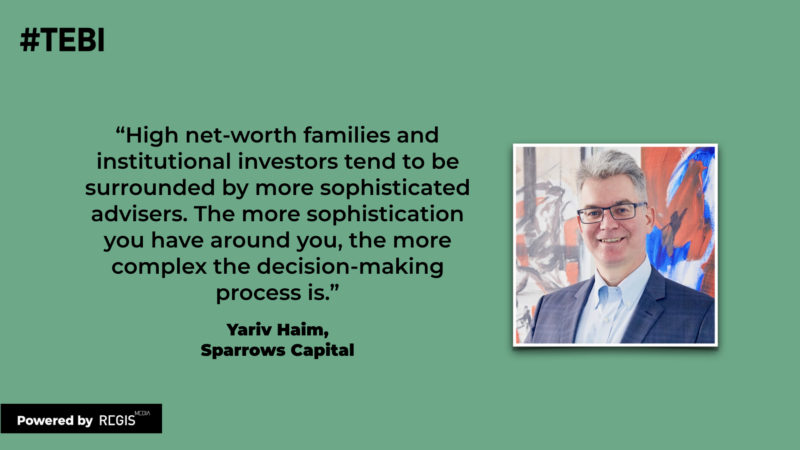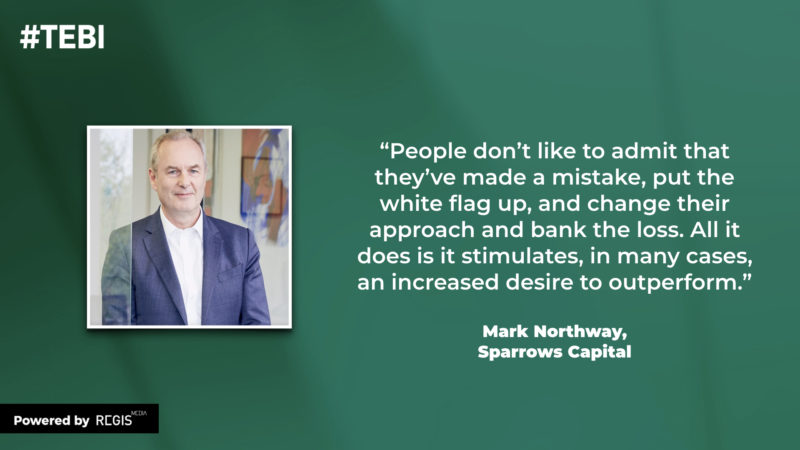
Surprised as I am at the relative lack of evidence-based financial advice businesses around the world, the shortage of evidence-based firms operating in the family office and institutional space is even more pronounced.
A firm whose work we admire is Sparrows Capital, which began as a family office in Jerusalem but has since moved to London, where it’s increasingly working with pension funds and charities.
Sparrows is not against using hedge funds or active management in principle, but it recommends that its clients use a core of passively managed funds. Its board includes the distinguished market historian Elroy Dimson.
I recently interviewed Sparrows Capital’s founder YARIV HAIM and its Investment Manager MARK NORTHWAY.
Why, I asked them, do most wealthy families and institutions still like to use complex strategies and expensive hedge funds? What changes are they seeing in institutional investing? And what changes do they expect to see in the years ahead?
Yariv and Mark, thank you for your time. Yariv, please start by telling us about Sparrows Capital and where you see your place in the market.
YH: It can probably be best described as a single family office. We work mainly to preserve capital on behalf of a Jerusalem-based family. Now, having had no experience in the financial world, what the family asked me to do was essentially take a sabbatical and do proper research to define what would be a sensible investment strategy going forward.
It is fair to say that our research concluded that there is a kind of an informational gap in the financial industry. On one hand, there are the managers and practitioners who argue that the best strategy for an investor is to seek alpha and try to outperform. But the academic research points quite conclusively in a very different direction. The vast majority of actively-run strategies, when you take into account their costs, tend to deliver results which are lacklustre compared to their appropriate benchmark.
Interestingly enough, in the last year or so, we have seen this inclination coming not only from the academic circle but also from regulators. The FCA published a market survey in 2017, concluding that, on average, most active funds tend to underperform their benchmarks; and the European regulator ESMA published a report in January echoing the FCA’s findings.
Mark, unlike Yariv, your background has been in the financial industry. Tell us about the journey you’ve been on.
MN: I think the first important thing to say is that we don’t take the approach that there’s no such thing as alpha. We simply take the approach that alpha is extremely elusive and extremely difficult to achieve consistently. I’ve seen a lot of strategies that have been put together where, effectively, the primary purpose of those strategies is to produce fees for the structurer rather than for the investor. So I approach this with a fair degree of scepticism, and I think it is evident that the application of skill to investing, although it is intuitively attractive, has historically resulted in a negative return, relative to a pure beta approach.
What most investors should focus on is achieving the returns that are available from the market, as simply as possible, as efficiently as possible, and for as low a cost as possible.
Yariv, family offices traditionally rely on costly and complex strategies. What reaction did you have from the family you work with when you came back from your sabbatical and told them they should primarily use low-cost index funds?
YH: Maybe surprisingly, they were not shocked by these findings. They had tried to access the best managers for many years before they asked me to try and assist. And while they had the experience of working with some high-profile managers, they always sensed that, at the end of the day, when you’re chasing the best performer of last year, you end up disappointed with the actual performance of the following year.
So they always had that gut feeling that this structure doesn’t really serve their interests as well as it might. My research pretty much substantiated their gut feeling and, in a way, allowed them to identify and crystallise a different investment approach.
I agree with your observation about wealthy investors using complex strategies. High net-worth families and institutional investors tend to be surrounded by more sophisticated advisers. These may come in the form of consultants, IFAs, family offices, and such; and the more sophistication you have around you, the more complex the decision-making process is.

Mark do you have an opinion on why extremely wealthy investors prefer complexity?
MN: I think it’s primarily behavioural. We’re talking about people who have made tremendous wealth through the application of skill and expertise; and it’s entirely unintuitive to someone of that make-up that they should take that wealth and invest it in a way which effectively decries the benefit of skill.
So, they are, in some cases, of the view that they can find the manager who is going to produce added value for them; and, in other cases, they are of the view (which is more dangerous, perhaps) that they themselves or their own family office are capable of adding that value. So their intuition leads them straight down a path towards active management, in some cases with fairly disastrous consequences.
Interestingly, the one cohort which does not behave like that is ex-fund managers and ex-owners of fund management companies, particularly in the hedge fund arena. It is definitely the case that hedge fund owners and hedge fund principals tend to invest in a way that is very similar to the evidence-based approach that we advocate.
Why do you think that is? It seems rather cynical to earn a living speculating with other people’s money and not be prepared to do it with your own.
MN: They would take a different line. They would say their entire business and livelihood is dependent on alpha and leverage; and, when it comes to banking the wealth they take from that, it’s time to take a different approach. But yes, I think, in some cases, one can see a degree of cynical behaviour.
As well as high-net-worth individuals, you also work with institutional investors — trusts, endowments, charities and so on. What response do you generally have from trustees when you talk about EBI?
MN: We get a variety of responses from trustees. You have to be aware that the investment consultant’s business model is typically heavily dependent on locating outperforming managers. Therefore, we represent some degree of threat to that process.
Again, it comes down to human behaviour. If you show a trustee that he or she has underperformed over time through manager selection, they are very loathe to do anything about until such a time as the situation changes, which effectively condemns them to carry on in the same manner ad infinitum.
People don’t like to admit that they’ve made a mistake, put the white flag up, and change their approach and bank the loss. All it does is it stimulates, in many cases, an increased desire to outperform. So there is a strange psychological reaction to that information.

As a firm, you’ve produced several case studies demonstrating that families or big institutions would have been far better off if they had embraced an evidence-based approach years ago. Tell us about those.
MN: What I think is clear, in all of the case studies that we have done, is that when one looks at the collective costs involved, the performance of active managers is generally significantly short of benchmark. There are two reasons for the shortfall, really. In some cases, it comes down to stock selection by the managers or by the fund itself, and in other cases, it comes down to timing. And those timing decisions have been made by the trust or by the manager or the consultant for positive reasons, for reasons of protecting the wealth which is entrusted to them. But the net result is almost always that they will take the money off the table at the first sign of volatility, then put it back, and not re-risk the portfolio until it’s too late. The effect is that they underperform what would have been the case had they done nothing.
Yariv, would you agree with Mark that this primarily a behavioural issue?
YH: Definitely, and it’s not just one bias where, if we overcome that one single factor, we can overcome all our psychological biases. Kahneman and Tversky showed that our loss aversion, how much we dislike losses, is not symmetric to how much we enjoy gains. So, that is quite an interesting theory and observation. It means that we prefer to potentially give up on certain potential gains, just for the sake of avoiding really relatively modest losses, even if they are just for the short-term.
Yes, we tend to be loss averse on the one hand, and yet overconfident on the other. It’s a dangerous combination, isn’t it?
YH: Absolutely. I think it has already been observed that what we do is, we tend to appreciate the good things that happen and ascribe them to ourselves. When we experience negative outcomes, we tend to blame other people or events that nobody could have foreseen. Therefore, that allows us to try and keep doing what we are doing and expect different results.
Unfortunately, in the world of investments, for long-term investors, it is unlikely that the traditional approach of trying to find alpha and outsmart everybody else will generate the desired outcome.
Having said that, you don’t exclusively recommend traditional indexing, do you?
MN: That’s right. We have what we term a barbell strategy. Our view is that investors need to have some hope that they will outperform — it’s something that we need to accept is there — but that if we simply invest everything they have for alpha, they will end up paying a large amount of fees for what is effectively underperformance.
So our view, and this is very much supported by the FCA and the findings of its asset management study, is that the majority of somebody’s portfolio is beta — it’s market exposure, it’s not skill. Across that beta, you shouldn’t be paying for skill. You should be accessing market exposure through highly efficient instruments like exchange-traded funds or index funds.
At the margins of that, by all means, go for alpha plays through selected managers and funds. But make sure you don’t miss out on the market returns across the bulk of your portfolio while you’re doing so. And use the efficient core invested in ETFs as a benchmark for how your alpha strategies are doing around the outside.
So, if you want private equity, if you want infrastructure, if you want mortgage-backed securities, by all means, use them as satellites around the core. But your core should be managed for high efficiency. And that is an interesting play because it doesn’t appeal psychologically to most people.
What about hedge funds? Historically they’ve almost been the investment vehicle of choice for family offices and institutions, but their net performance in recent years has been very poor.
MN: It is certainly the case that alternatives, and hedge funds in particular, have underperformed market exposures across the cycle, even taking into account the global financial crisis.
I think most institutional investors, where they are using alternatives, are tending to use them in addition to outright market exposure. They tend to view hedge funds as a way of distilling skill and distilling alpha, so you can make your portfolio construction decisions separately from trying to identify skill or inefficiencies that you can take advantage of.
So I think, in the case of the sophisticated institutional portfolio, there is an argument for an allocation to alternatives, primarily as a diversifier. Where people come unstuck is believing that hedge funds are a sensible way to construct an entire portfolio.
You mentioned private equity earlier. What’s your view on that?
YH: I think private equity essentially provides further diversification to a portfolio. It provides access to areas of the investable universe that are otherwise inaccessible. So there’s definitely a place for private equity in a broad portfolio. The question is, how big an exposure should you allocate? And you need to bear in mind the risks that are inherent in private equity investment. The other question, obviously, regards fees. I think the cost of private equity investment instruments today is still relatively high and we are living in in an era where investors are becoming more and more nervous about paying substantial fees to investment managers wherever they may invest.
MN: Another attraction of private equity as an asset class is that, theoretically at least, it provides access to a liquidity premium. A very large number of companies are unlisted, so if you can gain exposure to those companies and be paid a liquidity premium for doing so, then it’s logical to do it.
The other issue of it is the feedback loop. The time it takes to assess whether or not a private equity portfolio is performing well or performing badly is immensely long. Realistically, in some cases, it can be 20 to 25 years down the road, before you are able to say whether it did well or not.
Private equity also has issues around transparency, doesn’t it, in relation to both cost and performance?
YH: Yes, and that’s a concern because, if you want to adopt an evidence-based approach, you need to build it on the evidence you have in front of you. And it’s not surprising that people from the academic world are asking private equity firms and investment houses to publish their figures in a more transparent fashion, so they can scrutinise performance properly.
You’re very fortunate to have Elroy Dimson on your board. How important is that?
MN: Elroy is effectively the Eugene Fama on this side of the Atlantic. There hasn’t been the appreciation in the European investing industry — with the possible exception of countries like Germany — of the value of academics or of academic research. We still tend to have a more subjective, intuitive-based investment environment.
But I think that is changing. People are beginning to recognise that there is enough history to come to some serious conclusions. There are some lessons you can’t avoid — primarily the difficulty of identifying alpha, the importance of the strategic asset allocation for any investor, the importance of managing costs, and of diversification.
I think there is a movement. We’re now seeing a lot of the investment houses who historically regarded passive investing as simply a nuisance starting to produce their own offerings. They’re not necessarily leading with those offerings, but where a client asks for them, they’ll certainly have them available.
The other important thing about Elroy is that he chaired the Strategic Investment Council of the Norwegian Sovereign Wealth Fund for many years. There’s a real similarity between that fund and our own evidence-based investment philosophy. We have essentially followed the same learning pattern, reached the same conclusions, and we invest in a very similar manner. We expose our portfolio to the global investable market in a rule-based manner and simply rebalance back to the strategic asset allocation over time.
We think the performance of the Norwegian Sovereign Wealth Fund speaks for itself and we’re pleased to have Elroy on board as an adviser.
Finally, how do you see the industry changing over the next ten years or so?
I think the conversation is changing from active versus passive to what the role of alpha and beta in your portfolio should be. Those discussions were, initially, at an institutional level, but now they’re getting down to personal portfolios, and that process is helped by the arrival of robo-advisers, which tend to use fairly beta-heavy portfolios. I think that is a useful development.
We are going to see a continuation of the race to zero in terms of fees. Already, in the US, we’re seeing ETFs with zero fees. Europe hasn’t got their yet, but it’s heading in that direction. That in turn is driving down fees that active managers charge, and that is likely to result in some degree of consolidation in the active fund industry, which is probably overdue.
The other influence that we are expecting to see is that of machine learning. It’s very difficult to identify what machine learning will do to the industry. Arguably, it will increase the ability of the market-making community to take inefficiencies out of the market and therefore make markets more efficient and make production of alpha even more difficult. So, potentially, it increases the relevance of beta and beta-style investing.
There will undoubtedly be a series of hedge fund managers with machine learning capability who hold themselves up as being able to deliver that capability to the individual investor.We’ll have to see how that works.







